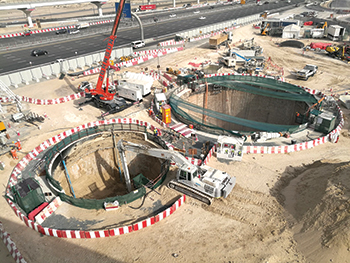DM working on $1.76bn infrastructure projects
01 February 2019
Dubai Municipality (DM) is currently implementing key infrastructure development projects worth Dh6.5 billion ($1.76 billion) including the Dubai Deep Tunnel Storm Water System and the world’s largest single waste-to-energy plant in the emirate.
A first-of-its-kind development in the Middle East, the Dubai Deep Tunnel Storm Water System aims to collect and convey groundwater and stormwater run-off, and then store it and direct it to the sea. The project is critical to face future challenges from rains over the next 100 years.
It has a capacity of 110 cu m per minute, which is double the flow of the Thames River in London, said the Dubai Municipality.
The project, which will drain 40 per cent of the entire area of the city, aims to serve the whole of Dubai South, which is home to Al Maktoum Airport and the Expo 2020, it added.
Meanwhile, the world’s largest single waste-to-energy plant is being built on two hectares of land in the Warsan area. The plant will process the city’s solid, industrial and commercial waste and convert it into electricity. Gases produced by the waste will be burned to turn a steam turbine to generate electricity.
Incombustible material will be left as recyclable ash, from which useful metals can be extracted for reuse. The gas will be treated with lime and filtered to minimise the release of pollutants during processing, said the municipality.
The plant is set to have a thermal transfer efficiency of 29 per cent, the highest in the world. Its first line will be operational in 2022, with all lines to be ready by 2023, spanning an area of 55 acres. The plant will have a processing capacity of 1.9 million tonnes a year, it added.
Other projects include the region’s first environmental nanometric satellite named DM SAT1, which is designed to collect and analyse environmental data that will be used to find solutions to tackle the increasing pollution in cities and to address climate change.
DM SAT1 is a joint project between Dubai Municipality and The Mohammed Bin Rashid Space Centre. The assembling of DM SAT1 is expected to be completed in the first quarter of 2019, and launched by the year-end.
- Abu Dhabi pumps $2.2bn into renewables
- EGA refinery in final stages of commissioning
- UAE developing AC regulations
- Abu Dhabi’s hyperloop ‘to cost $20-40m per km’
- ADPC, Mubadala and Masdar ink partnership
- DM working on $1.76bn infrastructure projects
- Al Ahli in deal to develop media ecosystem
- HSBC opens new $250m headquarters in Dubai
- Dubai sets record in cutting water losses
- Sports mall set for year-end completion
- GE, Sumitomo to build Sharjah’s first IPP
- ACI opens Mideast office in Dubai
- DWTC’s One Central completes retail phase
- Museum of the Future set to open in 2020
- In Brief



